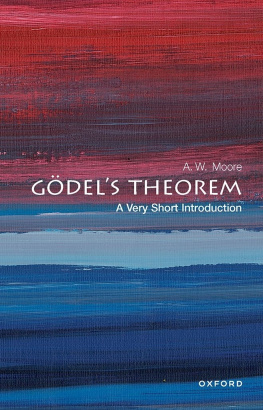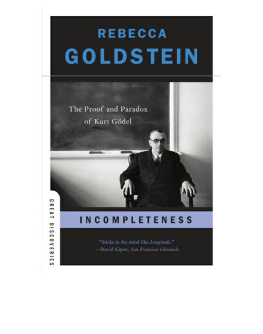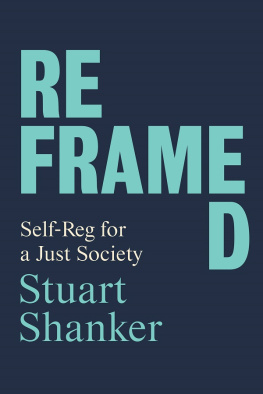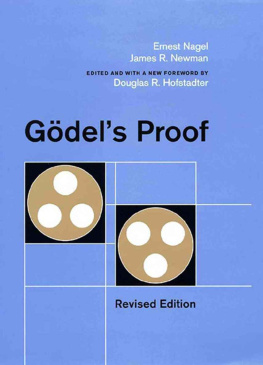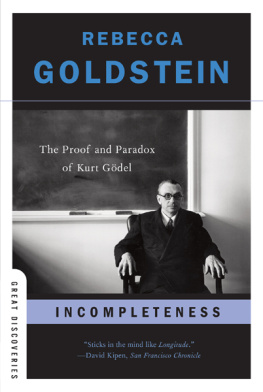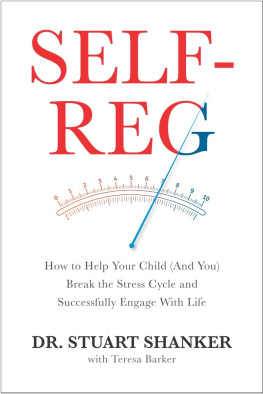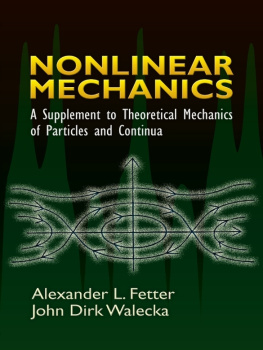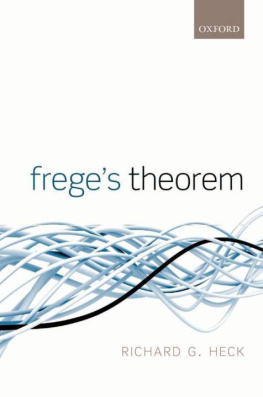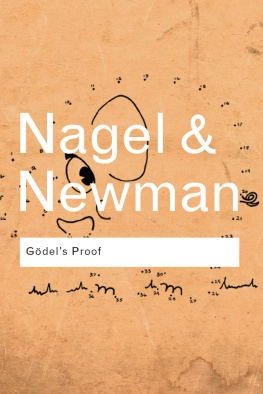Cover
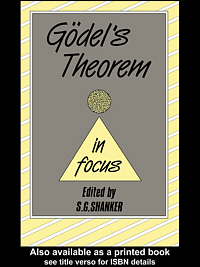
| title | : | Godel's Theorem in Focus Croom Helm Philosophers in Focus Series |
| author | : | Shanker, Stuart. |
| publisher | : | Taylor & Francis Routledge |
| isbn10 | asin | : |
| print isbn13 | : | 9780203407769 |
| ebook isbn13 | : | 9780585460901 |
| language | : | English |
| subject | Godel's theorem, Godel, Theoreme de, Godel's theorem |
| publication date | : | 1988 |
| lcc | : | QA9.65.G63 1988eb |
| ddc | : | 511.3 |
| subject | : | Godel's theorem, Godel, Theoreme de, Godel's theorem |
Page i
GDELS THEOREM IN FOCUS
Page ii
PHILOSOPHERS IN FOCUS SERIES
GDELS THEOREM IN FOCUS
Edited by S.G.Shanker
Page iii
Gdels Theorem in focus
Edited by S.G.Shanker

London and New York
Page iv
First published in 1988 by
Croom Helm Ltd
This edition published in the Taylor & Francis e-Library, 2003.
1988 Stuart Shanker
British Library Cataloguing in Publication Data
Gdels theorem in focus.
1. Gdels theorem
I. Shanker, S.G.
511.3 QA9.65
ISBN 0-7099-3357-6
ISBN 0-415-04575-4 (Pbk)
Library of Congress Cataloguing-in-Publication Data
ISBN 0-203-40776-8 Master e-book ISBN
ISBN 0-203-32352-1 (OEB Format)
ISBN 0-7099-3357-6 (Print Edition)
ISBN 0-415-04575-4 (Pbk)
Page v
Contents
Preface | vi |
Acknowledgements | viii |
I | John W.Dawson, Jr.: Kurt Gdel in Sharper Focus | |
II | Kurt Gdel: On Formally Undecidable Propositions of Principia Mathematica and Related Systems I (1931) | |
III | Stephen C.Kleene: The Work of Kurt Gdel | |
IV | John W.Dawson, Jr.: The Reception of Gdels Incompleteness Theorems | |
V | Solomon Feferman: Kurt Gdel: Conviction and Caution | |
VI | Michael D.Resnik: On the Philosophical Significance of Consistency Proofs | |
VII | Michael Detlefsen: On Interpreting Gdels Second Theorem | |
VIII | S.G.Shanker: Wittgensteins Remarks on the Significance of Gdels Theorem | |
Index | |
Page vi
Preface
An ever-growing number of sub-disciplines in philosophyranging from the philosophies of science and language to the philosophy of mind and aestheticsnow demand a working acquaintance with Kurt Gdels incompleteness theorems from their students. For Gdels theorems raise issues which lie at the very heart of modem attempts to revitalise metaphysics and/or the Mechanist Thesis. Unfortunately, given the highly technical nature of Gdels proof these debates have remained relatively inaccessible to those not trained in mathematical logic. The present book has been designed to meet these needs by providing a lucid introduction to the mechanics and mathematical import of Gdels proof. We begin with a short biographical sketch of Kurt Gdel by John W.Dawson, Jr., followed by Stephen Kleenes overview of Gdels work in mathematical logic. With this background in place we then address the mounting controversy in the philosophy of mathematics surrounding the philosophical significance of Gdels theorems.
Some will no doubt regard the latter phenomenon as a reflection of the inevitable time-lag between scientific and mathematical discoveries versus philosophical comprehension. Perhaps it will even be seen to corroborate the increasingly popular thesis in the sociology of knowledge that it is only once a science has digested the full implications of a breakthrough that it becomes the property of philosophers to exaggerate and distort. But unlike standard mathematical results Gdels theorems are inextricably linked to the epistemological disputes which they have sparked off; indeed, nowhere could this be more evident than in the writings of Gdel himself. It is not surprising, therefore, that Gdels theorems should present us with a catalogue of philosophical problems, many of which we are only just beginning to recognise, let alone resolve.
To begin with there is the anomalous reception of Gdels first incompleteness theorem; in the words of John W.Dawson, Jr., how was it that one of the most profound discoveries in the history of logic and mathematics was assimilated promptly and almost without objection by Gdels contemporaries? As Solomon Feferman shows us, this issue is intimately connected with the larger question of how Gdels subsequent work in
Page vii
mathematical logic and the growing confidence with which he expressed his platonist convictions relate to his earlier interpretation and presentation of the second incompleteness theorem. This brings us to the point where we can address the main concerns of the final three papers. First Michael Resnik outlines the seriousness of the sceptical problem created by Gdels theorems. Michael Detlefsen then takes up the challenge of attempting to rescue Hilberts Programme from the impasse in which Gdel apparently left it. In the final paper I examine the nature of this dilemma in the light of Wittgensteins attempt to resolve by dissolving the crisis created by Gdels theorems.
Like all philosophical sceptical problems the issues raised by Gdels theorems are pregnant with possibilities and fraught with dangers. Chief amongst the latter is an inevitable tendency to become distanced from the fons et origo of these developments. For it becomes ever more tempting and acceptable to rely on the findings of commentators who might themselves have based their readings on earlier summaries. To be sure, it is common practice to accept the verdict obtained by the experts in a field without inspecting their findings. But such custom presupposes concord. The ultimate aim of this book has been to outline the basis of the consensus which has hitherto obtained in order then to question it. It is our hope that this will stimulate renewed interest in the ongoing interpretation of the significance of Gdels incompleteness theorems.
S.G.Shanker
Atkinson College, York University
Page viii
Acknowledgements
I am deeply indebted to John W.Dawson, Jr. and Michael Detlefsen for their generous assistance in the design of this book. I have also benefited greatly from many fruitful discussions with Rainer Born. Lastly I would like to thank the Canada Council for the Postdoctoral Fellowship which enabled me to work on this project.
We are grateful to the authors and their publishers for permission to reprint the following articles:
Next page

